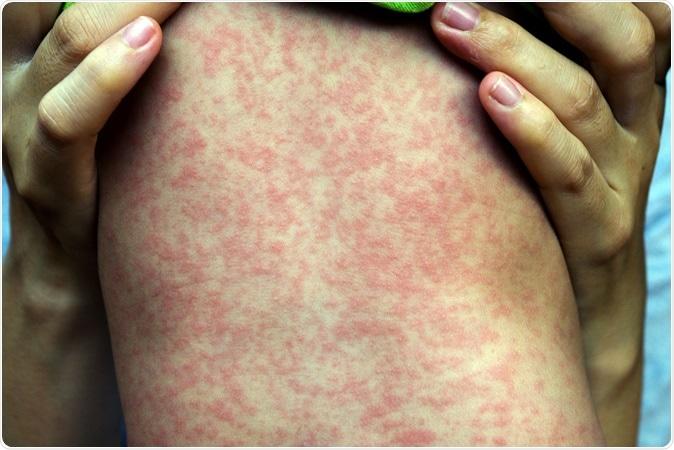Title: Understanding the Surge: Analyzing the Factors Behind australiaŌĆÖs Unprecedented Measles Outbreak
australia is currently facing a concerning surge in measles cases, a disease that had previously been largely controlled. Public health officials have reported a notable rise in infections,prompting urgent discussions about vaccination rates and public awareness. As health authorities work to manage this crisis,investigations indicate that various factors are contributing to this resurgence,including misinformation,vaccine hesitancy,and the ongoing repercussions of the COVID-19 pandemic. This article examines these underlying causes of the outbreak, its implications for public health, and essential actions being taken to safeguard at-risk populations throughout Australia.
Analyzing the Factors Behind the Measles Outbreak in Australia
The increase in measles cases across Australia can be linked to several interconnected issues that challenge public health systems. A primary factor is the drop in vaccination rates,which has been worsened by widespread misinformation regarding vaccines. Many parents are choosing to delay or forgo vaccinations due to misconceptions about their safety; this decline undermines herd immunity and allows for easier transmission of the virus within communities. Moreover, disruptions caused by the COVID-19 pandemic have hindered routine immunization services, resulting in an uptick of unvaccinated individualsŌĆöespecially children who missed their scheduled measles, mumps, and rubella (MMR) vaccinations.
Additionally, an influx of international travelers has significantly impacted this outbreak. With Australia’s borders reopening post-pandemic restrictions, unvaccinated individuals from regions with high levels of measles activity have re-entered local communitiesŌĆöintroducing new cases into populations with low immunity levels. urban areas with dense populations further exacerbate rapid virus transmission rates. The focus on other pressing public health issues may have diverted attention and resources away from necessary measles prevention effortsŌĆöcreating ideal conditions for this once-contained disease’s resurgence.
Vaccine Hesitancy and Its Consequences for Public Health in Australia
The escalating number of measles cases can be largely attributed to increasing vaccine hesitancyŌĆöa trend posing serious challenges for public health officials. This reluctance often arises from a mix of misinformation campaigns, personal beliefs against vaccination practices, and distrust towards healthcare institutions. As false narratives gain traction within communities, there is heightened risk not only on individual levels but also across society as a whole; weakened herd immunity endangers vulnerable groups such as infants or those with compromised immune systems.
Experts warn that without immediate action through community engagement initiatives aimed at restoring trust in vaccinesŌĆöthe situation could worsen dramatically over time. A review highlighting recent vaccination trends reveals alarming statistics:
| Year | Vaccination Rate (%) | Total Measles Cases |
|---|---|---|
| 2020 | 93% | 25 Cases |
| 2021 | 90% | 50 Cases |
| 2022 | 85% | 150 Cases |
This data illustrates a troubling correlation between declining vaccination rates and rising instances of measles infectionsŌĆöunderscoring an urgent need for effective communication strategies alongside community outreach programs focused on education initiatives addressing vaccine hesitancy directly.
approaches to Enhancing Vaccination Rates and Preventing Future Outbreaks
Tackling Australia’s rising incidence rate requires multifaceted strategies aimed at boosting overall immunization coverage among residents effectively.
A focus on educational outreach initiatives will play an essential role here: These programs should aim not only at dispelling common myths surrounding vaccines but also emphasizing their critical benefits through workshops held locally or via social media campaigns designed specifically targeting parents’ concerns while fostering open dialogue between healthcare professionals & families alike.
Moreover, improving access points where people can receive vaccinations easily ŌĆösuch as pop-up clinics located strategically during community eventsŌĆöcan significantly enhance participation numbers overall.
Collaborating closely with schools/childcare centers ensures students meet required immunization standards before enrollment too; thus combating misinformation while promoting healthier environments conducive towards child growth overall!
Additionally refining surveillance systems capable enough tracking current immunization statistics helps identify under-immunized demographics early-on allowing timely interventions when needed most!
Targeted outreach programs tailored specifically vulnerable groups must provide relevant messaging/resources addressing barriers faced by those unable access traditional healthcare options due socio-economic constraints etc., strengthening partnerships amongst government agencies/healthcare providers/community organizations creates robust networks sharing vital data/resources efficiently! By leveraging data-driven approaches implementing responsive measures like emergency drives during outbreaks will mitigate risks associated future occurrences while cultivating resilient informed societies moving forward!
Looking Ahead: The Future Outlook on Measles Prevention Efforts In Australia!
As Australians confront unprecedented challenges posed by current outbreaks affecting population-wide well-beingŌĆöitŌĆÖs crucial recognize implications extend beyond mere statistics alone! With declining numbers seen recently coupled alongside rampant spread falsehoods surrounding vaccinationsŌĆöit serves reminder importance maintaining collective responsibility ensuring community immunity remains intact long-term too! Public Health Officials urge renewed commitment towards comprehensive campaign efforts educating citizens safeguarding both individual/public welfare alike moving forward together united front against preventable diseases like these ones we face today!
Considering all aspects involved hereŌĆöit becomes imperative parents/caregivers critically evaluate information encountered regarding immunizations engaging conversations openly discussing concerns raised directly healthcare professionals whenever possible too! Collaboration/informed actions remain key elements curbing resurgence preventable illnesses such as these ones weŌĆÖre witnessing now firsthand right before our eyes today stillŌĆ”
Moving ahead itŌĆÖs vital every Australian prioritizes protecting communal interests ensuring lessons learned resonate deeply throughout generations yet unborn ahead still waiting patiently behind us all right nowŌĆ” The fight against diseases like Measels isnŌĆÖt over yetŌĆönot even closeŌĆöand shared accountability plays pivotal role safeguarding futures generations yet unborn awaiting bright tomorrows filled hope instead darkness looming overhead threatening lives everywhere around us constantly each passing day stillŌĆ”




